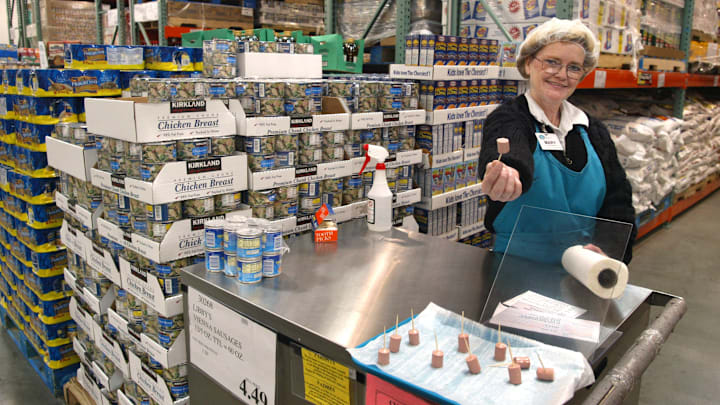Part of the appeal for shoppers at warehouse giant Costco is investigating all the free samples of food before a main course of their $1.50 hot dog and soda combo. These stations are typically operated by hospitality workers. But it’s now looking like you may soon be helping yourself to those cheese wedges.
According to The Takeout, Costco appears to be phasing out humans from sample stations, a likely consequence of figuring out that self-serve kiosks are cheaper than paying someone a wage to extoll the virtues of a product.
One such kiosk was spotted in the spring in Issaquah, Washington. The kiosk offered up Mott’s Fruit Snacks with a product chute similar to that of a vending machine. If consumers liked what they grabbed, stacks of Mott’s were conveniently placed right behind the display.
Though it’s anecdotal for now—Costco has yet to comment on the development—it would fall in line with the increasingly automated nature of retail storefronts, which are embracing self-checkout lanes and eliminating positions for humans.
Self-serve kiosks in particular have been growing their footprint in retail, with stores like Sam’s Club and Safeway offering samples. A new app, Freeosk, helps shoppers track which stores have which products on offer. Want to grab some Tide Pods? A local Shop Rite may be handing them out.
Strictly speaking, it’s not Costco or other stores reducing the sample workforce. Product demonstrators are typically employed by third parties contracted by consumer goods companies to endorse merchandise. Club Demonstration Services (CDS) is one such entity that works with Costco. The demonstrators get briefed on the product, then hype it to customers.
While self-serve may reduce labor costs, there may not be much data available on whether it satisfies the primary demonstrator purpose of boosting sales. (Some estimates place sample stations as igniting as much as a 2000 percent increase.) Humans can also monitor stations for food safety, making sure customers don’t cross-contaminate a food area. If a product is fresh, like hot food, it’s unlikely a kiosk will be spitting it out anytime soon.
Kiosks might also defeat what some demonstrators call the shame factor, or the idea that shoppers will opt to buy a product rather than keep asking for free samples. A machine, after all, can’t judge you.
